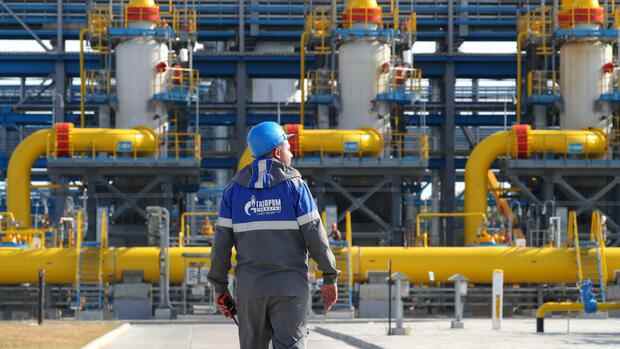Vienna How Western European gas buyers will pay the Russian supplier Gazprom in the future has apparently still not been clarified. “We are still looking for a solution,” said Alfred Stern, head of the Austrian oil, gas and chemical group OMV, on Friday.
OMV will receive the next monthly invoice from Gazprom in May. From then on, the new payment terms will also apply. At the end of March, Russian President Vladimir Putin decreed that companies from “hostile countries” must open a ruble account with Gazprombank to pay for the deliveries. At the same time, buyers are not allowed to transfer rubles to Russia because, according to EU Commission President Ursula von der Leyen, they would violate the sanctions regime.
Gas buyers stand between the fronts. Many parties are involved in the transaction, Stern said. “We have discussions with them.”
The solution to the dilemma seems to be that the companies set up accounts in euros and rubles at Gazprombank. Thus, buyers can transfer money for gas in foreign currency to one account, after which the bank buys rubles for it on the Moscow Stock Exchange. These are then credited to the buyer’s second account, the ruble account, and transferred to the supplier Gazprom.
Top jobs of the day
Find the best jobs now and
be notified by email.
However, one open question now is how long the money will remain in the euro account and to what extent the Russian central bank is involved in the transaction. If the currency is not exchanged immediately, the transfer can also be viewed as a loan in euros – and such is prohibited from the EU’s point of view.
OMV and Austria in particular are in a special situation. In 1968, OMV was the first Western company to sign a gas contract with the then Soviet Union. Since then, Austria’s dependency on Russian supplies has steadily increased. Stern campaigned for understanding. “Liquid gas as an alternative was not an issue 20 years ago,” he said. In addition, Russia and the Soviet Union were the obvious suppliers purely because of their geography – and they always delivered reliably.
OMV wants to break away from Russia
Austria currently covers between 70 and 80 percent of its gas needs with imports from Russia. At the same time, OMV has been heavily involved in business in Russia, but is now trying to cut ties as quickly as possible. The stake in the Yuzhno Russkoye gas field of 24.99 percent is to be sold. As a precaution, OMV made a write-off of one billion euros here.
The value adjustment on a loan that OMV had granted to the pipeline company Nord Stream 2 is about the same. It is still unclear how the company will get out of its supply contract with Gazprom, which runs until 2040. CEO Stern is silent on the exit clauses.
However, OMV should survive the withdrawal from Russia unscathed. The company is currently generating high cash flow, amounting to EUR 3.4 billion in the first quarter of this year. Like other companies in the sector, OMV is benefiting from the sharp rise in oil prices and the production discipline of the member countries of the Opec plus oil alliance.
>>Read here: Energy companies are preparing new payment methods for Russian natural gas
In addition, the company continues to generate high profits in the petrochemicals sector: although the plastics business has weakened somewhat in some areas, the demand for nitrogen for fertilizer production is high.
The new OMV boss managed Borealis for several years. OMV increased its stake in the plastics company to 75 percent in 2020.
(Photo: Leonhard Foeger)
In contrast to OMV, Austria will find it much more difficult to cut its cord from Russia. The state holds a 31.5 percent stake in OMV, which means it can look forward to rising dividends. But the dependency in which Austria has placed itself on Russia is great. Large-scale industry in particular does not believe that it can do without Russian gas for the time being.
The government of Chancellor Karl Nehammer (ÖVP) is therefore one of the vehement opponents of a gas embargo against Russia in the EU. And this position is supported without a murmur by the Greens, the coalition partner of the ÖVP.
A study by the Ministry of Energy, which is led by Green Party politician Leonore Gewessler, came to the conclusion this week that Austria will only be able to do without Russian gas from 2027. And that, too, is only possible “with a national and international effort”.
By then, Austria wants to reduce its gas consumption by a quarter, expand the production of biogas and hydrogen and increasingly purchase natural gas from other countries. One source is said to be the Norwegian offshore fields.
Still, according to Stern, no one should be chasing illusions. “Norwegian gas production is not enough to replace Russian gas,” said the OMV boss. Nehammer and business representatives had already visited Abu Dhabi and Qatar at the beginning of March, as did Federal Minister of Economics Robert Habeck later. However, it is questionable whether this was successful: Qatar is not dependent on additional customer inquiries.
More: “I want to wash myself clean”: Gazprom manager changes sides and is now fighting for Ukraine
